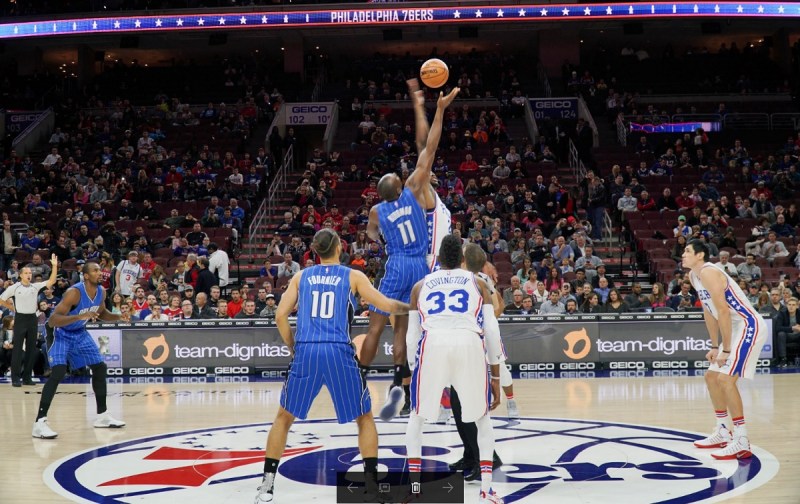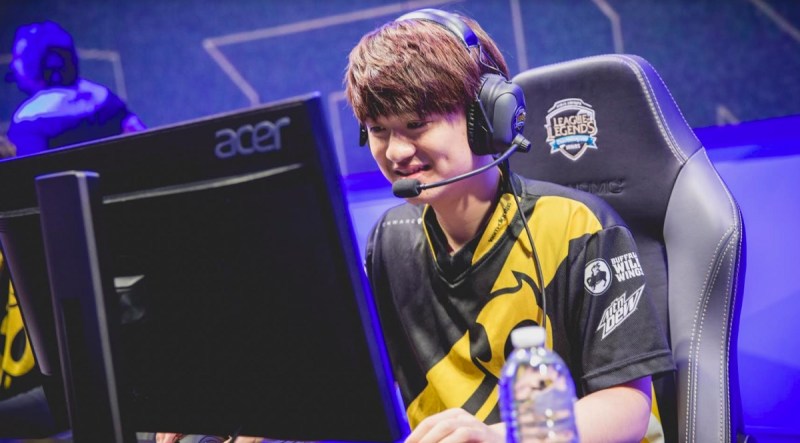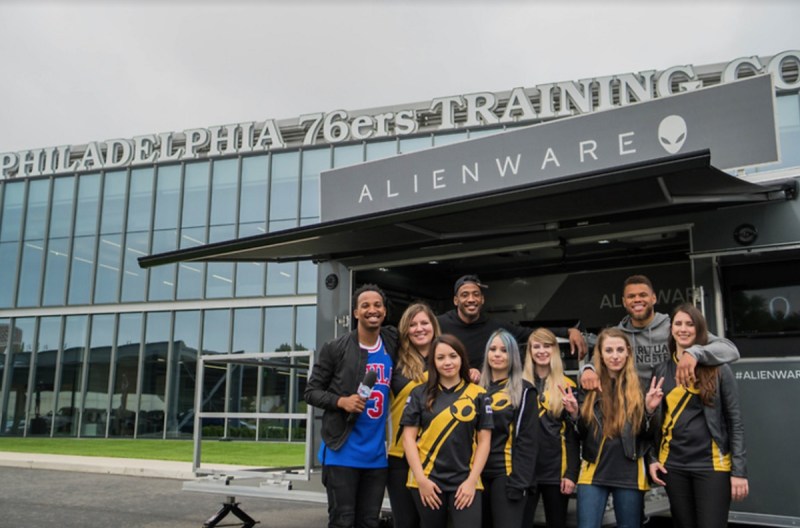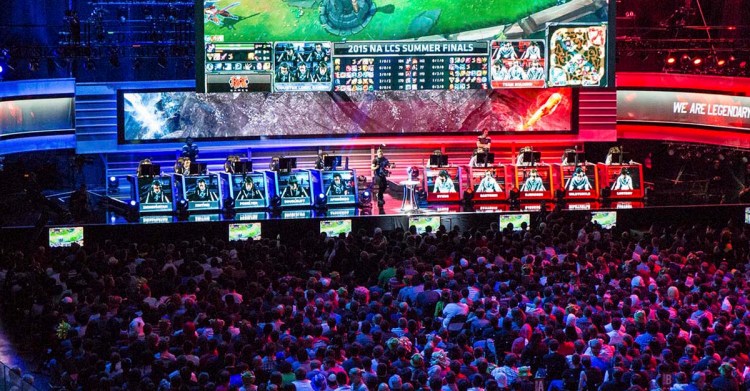
Above: Team Dignitas signs at the 76ers game.
GamesBeat: It seems like there’s an interesting question around which games are going to take off as esports. Call of Duty is such a big game, but it seems like League of Legends is a better sport. Counter-Strike might be as well, because it so rarely changes. I also wonder whether some of the sports simulations could take off as well – NBA2K and Madden. They have real-world counterparts on television that would be much bigger, though.
O’Neil: We have an NBA2K team. Again, it’s the same formula. Do you have a passionate fanbase? Check. Do you have incredible management? Check. Do you want to be in that space? Check. For us it’s very simple. What I love about the space is—your question is very interesting, and the good news is, all you have to do is ask. It’s the first sports league, looking at League of Legends, where you literally just have to ask.
A lot of the stuff we’ve done, whether it’s making an announcement or launching a new initiative or looking at new branding, all you have to do is go on Reddit. Ask the question and get the answer. You want to sample this passionate fanbase—it’s like having a realtime marketing, sales, and business consultant at your disposal all the time. That provides an incredible opportunity to learn. I don’t think you really have to wonder what the next game is going to be. You just have to sample it and ask.
Richardson: From the perspective of both team owners and investors, we’re constantly meeting with and talking to publishers who have competitive games, whether they’re mobile or console or PC. We’re certainly playing all these games as they come out. The publishers are realizing the power of esports, first and foremost, as a marketing vehicle. Their most passionate players want to play competitively. They want to understand who’s the best player in their area or their country or the world. Giving them the means to do that, making it feel like their participation and spectating in that game is important, has a hugely positive impact on their long-term retention and engagement of those users.
June 5th: The AI Audit in NYC
Join us next week in NYC to engage with top executive leaders, delving into strategies for auditing AI models to ensure fairness, optimal performance, and ethical compliance across diverse organizations. Secure your attendance for this exclusive invite-only event.
Then there’s a handful of games that get enough escape velocity, as far as the value of the content being spectated, where you can build a franchise model and a media business behind them. Again, not only did League of Legends pioneer this, but Riot really got out in front of it and has created something where even people who aren’t actively playing League are still watching. They care deeply about where the game is going, who the best teams and players are. Something very similar to the emotional connection people have with the NFL or NBA has emerged. I don’t know if that will happen for every game, but it certainly has for League. Riot’s done a great job of curating and shepherding that.

Above: Team Dignitas in action
GamesBeat: I do wonder how we’ll get from the many competitions and tournaments and leagues down to one big league in each of these games. It seems like that process will take quite a long time.
O’Neil: It might. But because League of Legends is such an incredibly popular game, the grass roots might become as much of a supportive funnel to build the overall game as anything else. I’m not sure they disappear. It might be the foundational piece that continues to feed exponential growth.
GamesBeat: Watching the DotA 2 and Call of Duty tournaments was interesting to me. I’m a big Call of Duty fan, but not so much DotA 2. The ability to follow what was going on was vastly different for me. I can follow Call of Duty, even though it’s going very fast, but with DotA 2 I was completely lost. I’m still amazed that the broadcasters can catch up so fast with what’s going on.
Richardson: I think that’s exciting in the sense that–the publishers embracing the notion of their competitive games having a chance to be esports are also saying, “What do we need to do to make sure this is easy to understand for people? How do we get them into the game quickly?” It’s hugely advantageous for the Riots of the world to have their games be free to play, because you can watch it and be overwhelmed the first time you see it, maybe, but then you can download it, start to play, and pretty soon you have enough context to make both playing the game enjoyable, but also watching it.
You’re going to see some opportunities emerge where publishers are going to try to invest in the amateur side of things – the equivalent of your softball leagues, maybe even down to kids in Little League. All those things are going to start to emerge, and that will create an awareness and understanding of the rules in the games that get that escape velocity, enough to be big media businesses. People won’t just be walking into it not knowing what’s going on.
I remember backpacking around Europe after college, sitting at a pub in London and watching cricket. I sat there in the pub for probably four hours without any clue to what was going on. After that it was fun to watch, but it took that up-front investment.

Above: Team Dignitas in a tournament
GamesBeat: On the training side, are you guys finding that there is this benefit from having the pros play and then studying the analytics behind that? I get pitched a lot of stories related to things calling themselves the Moneyball of esports. Can you get insights from data that make a player that much better?
O’Neil: Baseball is a sport that lends itself to analytics at the highest level. Hockey is probably the least likely. But one thing I’ve found in sports that I’m sure is also true in esports is that the blend of art and science is the magic of building a team. Speaking around League of Legends specifically, you have a five on five game. Communication and teamwork are more critical than individual excellence, every time. But the analytics platforms–because every keystroke in the game is on record forever, we have an opportunity for analytics to play an enormous role in the future.
How that becomes a competitive advantage, becomes more of a commodity, should be something very interesting to track and see. But it’s not just the data, is what we’ve found. It’s how you use the data.
Richardson: One thing for us, as the first professional sports organization in North America to make a direct investment in an esports team, we’ve gotten to create a lot of operating synergies, and one of them is around player development. Some of that has to do with the analytics piece, but some of it has to do with taking care of the players. We just had the nutritionist with the 76ers working with the chef at our League of Legends house in Santa Monica on how to instrument the right kind of game plan for each of the players individually in terms of the meals they’re getting. We’re starting to leverage the training center in Philadelphia for boot-camping our players.
It’s taking what has existed in the ball-and-stick sports space, the evolution of sports science and psychology and player development—even helping them outside the competitive areas, with their finances and other things. We really see ourselves as pioneers in that space.

Above: Team Dignitas training center.
GamesBeat: I noticed that the rosters still seem to change fairly frequently. Is that another sign that the sport’s still fairly young?
Richardson: My perspective is that it depends a bit on the game. When there’s more maturity in the ecosystem, you’ll see slightly less turnover in the rosters. That said, we have certainly made some roster upgrades just since last summer that helped us get to the playoffs, and hopefully we’re poised to make a run here at the worlds. We’ll find out this weekend as the playoffs start. But because it is five on five, you’re constantly looking for chemistry. It’s not just identifying the best player at a position, but how these individuals come together as a group and make something greater than the sum of the parts.
We took ownership of the two teams and combined them last fall. We’re continuing to learn from iteration around the roster. The good news is, as we get franchising and the LCS goes into that next stage of its evolution, you’ll see a lot more career-lengthening aspects for the players, and a bit more roster stability, which is great for the fans as well.
GamesBeat: One of the themes for our conference coming up this fall is this idea of a leisure economy. With the emergence of an ecosystem around streamers, influencers, esports players, we’re seeing more and more people actually getting paid to play games. Do you have any thoughts on what that means and where that’s going?
O’Neil: People have been paid to play games since the Roman colosseums, fighting off the lions. Now, what we see more than anything is a democratization of that, and the opportunity that provides.
Richardson: Games are interactive. That’s one of the fun things about this. You and I have been in this space for a long time. What’s cool about the emergence of elite competitive video gaming is the relation we all can feel as players to the best in the world. It’s an easy and short gap. When I watch Joel Embiid for the Sixers, I can only dream of being as tall and athletic as he is. But when I’m playing League or playing Clash Royale and then I watch the best players, I have this sense of connection to what they’re doing in a way that’s pretty visceral. That’s powerful. It’s one of the reasons we’re excited about continuing to be investors in the space.


